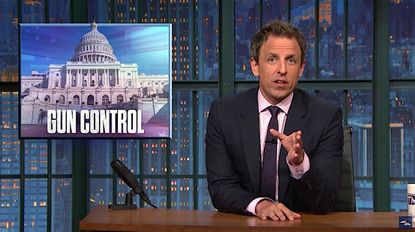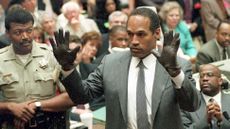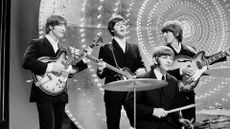Seth Meyers tries to explain why the NRA keeps winning on gun control


On Monday, the Senate considered four gun control measures — two from Republicans and two from Democrats — and blocked all of them. That's just fine with the NRA, Seth Meyers said on Tuesday's Late Night. The Democratic measure, including universal background checks and banning gun sales for people on terrorist watch lists, are broadly popular with voters, but Republicans keep blocking them.
Now, "the NRA has given more than $36 million to the 56 Republican senators who blocked the gun control measures on Monday," Meyers said. "The money may be a factor, but it's not the only — or even the main — reason the NRA is so powerful. It's that the gun owners are passionate and mobilized, and often vote on this one issue alone — which is why, every election cycle, politicians have to go through the ritual of professing their love of guns, even if they have to fake it." (He's looking at you, Mitt Romney.)
"But now there are fortunately some signs that the politics of gun control may be slowly changing," Meyers added, noting that Hillary Clinton has made it a centerpiece of her campaign and two vulnerable Republican senators voted for Democratic-backed measures. "Hopefully that means there will be a political price to be paid for lawmakers who oppose gun control at the behest of the NRA, because that's the only way we'll make progress on this issue, if gun control advocates out-organize the NRA and voters hold pro-gun politicians accountable at the ballot box." For Meyers' analysis, and his appreciation of President Obama's standup comedy skills (starting with Clinton and guns), watch below. Peter Weber
Subscribe to The Week
Escape your echo chamber. Get the facts behind the news, plus analysis from multiple perspectives.

Sign up for The Week's Free Newsletters
From our morning news briefing to a weekly Good News Newsletter, get the best of The Week delivered directly to your inbox.
From our morning news briefing to a weekly Good News Newsletter, get the best of The Week delivered directly to your inbox.
Create an account with the same email registered to your subscription to unlock access.
Sign up for Today's Best Articles in your inbox
A free daily email with the biggest news stories of the day – and the best features from TheWeek.com
Peter has worked as a news and culture writer and editor at The Week since the site's launch in 2008. He covers politics, world affairs, religion and cultural currents. His journalism career began as a copy editor at a financial newswire and has included editorial positions at The New York Times Magazine, Facts on File, and Oregon State University.
-
 'Criminal trail?'
'Criminal trail?'Today's Newspapers A roundup of the headlines from the US front pages
By The Week Staff Published
-
 Grindr 'shared user HIV status' with ad firms, lawsuit claims
Grindr 'shared user HIV status' with ad firms, lawsuit claimsSpeed Read LGBTQ dating app accused of breaching UK data protection laws in case filed at London's High Court
By Rebecca Messina, The Week UK Published
-
 The best dog-friendly hotels around the UK
The best dog-friendly hotels around the UKThe Week Recommends Take a break with your four-legged friend in accommodation that offers you both a warm welcome
By Adrienne Wyper, The Week UK Published
-
 OJ Simpson, star athlete tried for murder, dead at 76
OJ Simpson, star athlete tried for murder, dead at 76Speed Read The former football hero and murder suspect lost his battle with cancer
By Rafi Schwartz, The Week US Published
-
 Momofuku's 'Chili Crunch' trademark uproar
Momofuku's 'Chili Crunch' trademark uproarSpeed Read The company's attempt to own the sole rights has prompted backlash
By Rafi Schwartz, The Week US Published
-
 Kevin Hart awarded Mark Twain Prize
Kevin Hart awarded Mark Twain PrizeSpeed Read He is the 25th recipient of the prestigious comedy prize
By Peter Weber, The Week US Published
-
 Is Downton Abbey set to return for a final film?
Is Downton Abbey set to return for a final film?Speed Read Imelda Staunton reveals that a third movie may be in the pipeline
By Adrienne Wyper, The Week UK Published
-
 'Oppenheimer' sweeps Oscars with 7 wins
'Oppenheimer' sweeps Oscars with 7 winsspeed read The film won best picture, best director (Christopher Nolan) and best actor (Cillian Murphy)
By Peter Weber, The Week US Published
-
 'Rust' armorer convicted of manslaughter
'Rust' armorer convicted of manslaughterspeed read The film's cinematographer Halyna Hutchins was shot and killed by actor Alec Baldwin during rehearsal
By Peter Weber, The Week US Published
-
 The Beatles are getting 4 intersecting biopics
The Beatles are getting 4 intersecting biopicsSpeed Read Director Sam Mendes is making four separate movies, each told from the perspective of one band member
By Peter Weber, The Week US Published
-
 Taylor Swift to Miley Cyrus: female artists dominate 2024 Grammys
Taylor Swift to Miley Cyrus: female artists dominate 2024 GrammysSpeed Read SZA, Phoebe Bridgers and Lainey Wilson were also among the winners at LA gala
By Arion McNicoll, The Week UK Published
